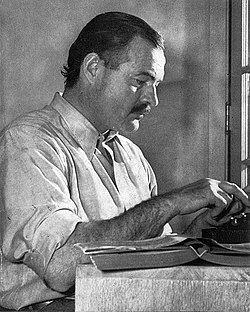Ernest Hemingway Quote
Once in camp I put a log on a fire and it was full of ants. As it commenced to burn, the ants swarmed out and went first toward the center where the fire was; then turned back and ran toward the end. When there were enough on the end they fell off into the fire. Some got out, their bodies burnt and flattened, and went off not knowing where they were going. But most of them went toward the fire and then back toward the end and swarmed on the cool end and finally fell off into the fire. I remember thinking at the time that it was the end of the world and a splendid chance to be a messiah and lift the log off the fire and throw it out where the ants could get off onto the ground. But I did not do anything but throw a tin cup of water on the log, so that I would have the cup empty to put whiskey in before I added water to it. I think the cup of water on the burning log only steamed the ants.
Once in camp I put a log on a fire and it was full of ants. As it commenced to burn, the ants swarmed out and went first toward the center where the fire was; then turned back and ran toward the end. When there were enough on the end they fell off into the fire. Some got out, their bodies burnt and flattened, and went off not knowing where they were going. But most of them went toward the fire and then back toward the end and swarmed on the cool end and finally fell off into the fire. I remember thinking at the time that it was the end of the world and a splendid chance to be a messiah and lift the log off the fire and throw it out where the ants could get off onto the ground. But I did not do anything but throw a tin cup of water on the log, so that I would have the cup empty to put whiskey in before I added water to it. I think the cup of water on the burning log only steamed the ants.
Related Quotes
This is a day of celebration!Today, we are divorcing the pastand marrying the present.Dance,and you will find Godin every room.Today, we are divorcing resentmentand marrying forgiveness.Sing,and God w...
About Ernest Hemingway
Hemingway was raised in Oak Park, Illinois, a suburb of Chicago. After high school, he spent six months as a reporter for The Kansas City Star before enlisting in the Red Cross. He served as an ambulance driver on the Italian Front in World War I and was seriously wounded by shrapnel in 1918. In 1921, Hemingway moved to Paris, where he worked as a foreign correspondent for the Toronto Star and was influenced by the modernist writers and artists of the "Lost Generation" expatriate community. His debut novel, The Sun Also Rises, was published in 1926. In 1928, Hemingway returned to the U.S., where he settled in Key West, Florida. His experiences during the war supplied material for his 1929 novel A Farewell to Arms.
In 1937, Hemingway went to Spain to cover the Spanish Civil War, which formed the basis for his 1940 novel For Whom the Bell Tolls, written in Havana, Cuba. During World War II, Hemingway was present with Allied troops as a journalist at the Normandy landings and the liberation of Paris. In 1952, his novel The Old Man and the Sea was published to considerable acclaim, and won the Pulitzer Prize for Fiction. On a 1954 trip to Africa, Hemingway was seriously injured in two successive plane crashes, leaving him in pain and ill health for much of the rest of his life. He committed suicide at his house in Ketchum, Idaho, in 1961.
